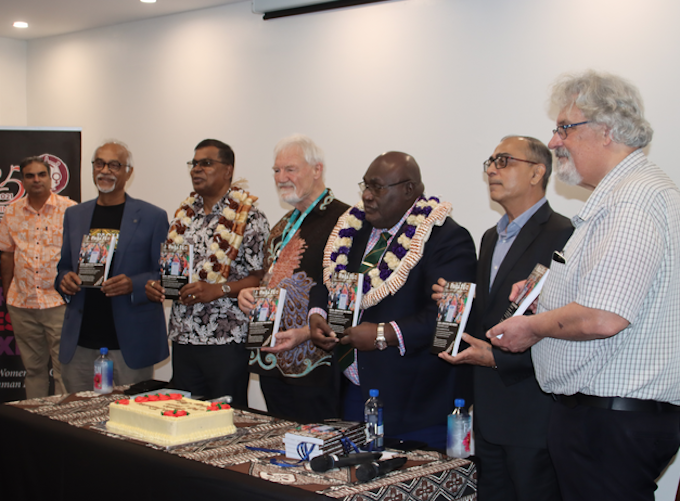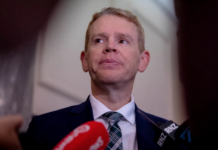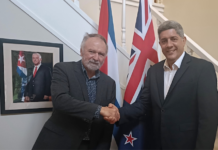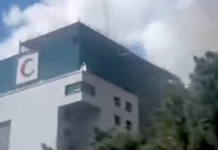
Here is the speech by Papua New Guinea’s Minister for Communication and Information Technology, Timothy Masiu, at the 2024 Pacific International Media Conference dinner at the Holiday Inn, Suva, on July 4:
I thank the School of Journalism of the University of the South Pacific (USP) for the invitation to address this august gathering.
Commendations also to the Pacific Islands News Association (PINA) and the Asia Pacific Media Network (APMN) for jointly hosting this conference – the first of its kind in our region in two decades!
It is also worth noting that this conference has attracted an Emmy Award-winning television news producer from the United States, an award-winning journalism academic and author based in Hong Kong, a member of the New Zealand Order of Merit, a finalist in the 2017 Pulitzer Prize, and a renowned investigative journalist from New Zealand.
Mix this with our own blend of regional journalists, scholars and like-minded professionals, this is truly an international event.
Commendation to our local organisers and the regional and international stakeholders for putting together what promises to be three days of robust and exciting interactions and discussions on the status of media in our region.
This will also go a long way in proposing practical and tangible improvements for the industry.
My good friend and the Deputy Prime Minister of Fiji, the Honourable Manoa Kamikamica, has already set the tone for our conference with his powerful speech at this morning’s opening ceremony. (In fact, we can claim the DPM to also be Papua New Guinean as he spent time there before entering politics!).
We support and are happy with this government of Fiji for repealing the media laws that went against media freedom in Fiji in the recent past.
In PNG, given our very diverse society with over 1000 tribes and over 800 languages and huge geography, correct and factful information is also very, very critical.

Our theme “Navigating Challenges and Shaping Futures in Pacific Media Research and Practice” couldn’t be more appropriate at this time.
If anything, it reminds us all of the critical role that the media continues to play in shaping public discourse and catalysing action on issues affecting our Pacific.
We are also reminded of the power of the media to inform, educate, and mobilize community participation in our development agenda.
IT is in the context that I pause to ask this pertinent question: How is the media being developed and used as a tool to protect and preserve our Pacific Identity?
I ask this question because of outside influences on our media in the region.
I should know, as I have somewhat traversed this journey already – from being a broadcaster and journalist myself – to being a member of the board of the largest public broadcaster in the region (National Broadcasting Corporation) – to being the Minister for ICT for PNG.
From where I sit right now, I am observing our Pacific region increasingly being used as the backyard for geopolitical reasons.
It is quite disturbing for me to see our regional media being targeted by the more developed nations as a tool to drive their geopolitical agenda.
As a result, I see a steady influence on our culture, our way of life, and ultimately the gradual erosion of our Pacific values and systems.
In the media industry, some of these geopolitical influences are being redesigned and re-cultured through elaborate and attractive funding themes like improving “transparency” and “accountability”.
This is not the way forward for a truly independent and authentic Pacific media.
The way we as a Pacific develop our media industry must reflect our original and authentic value systems.
Just like our forefathers navigated the unchartered seas – relying mostly on hard-gained knowledge and skills – we too must chart our own course in our media development.
Our media objectives and practices should reflect all levels of our unique Pacific Way of life, focusing on issues like climate change, environmental preservation, the protection and preservation of our fast-fading languages and traditions, and our political landscape.
We must not let our authentic ways be lost or overshadowed by outside influences or agendas. We must control WHAT we write, HOW we write it, and WHY we write.
Don’t get me wrong – we welcome and appreciate the support of our development partners – but we must be free to navigate our own destiny.
If anything, I compel you to give your media funding to build our regional capabilities and capacities to address climate change issues, early warning systems, and support us to fight misinformation, disinformation, and fake news on social media.
I don’t know how the other Pacific Island countries are faring but my Department of ICT has built a social media management desk to monitor these ever-increasing menaces on Facebook, Tik Tok, Instagram and other online platforms.
This is another area of concern for me, especially for my future generations.
Draft National Media Development Policy of PNG
Please allow me to make a few remarks on the Draft National Media Development Policy of PNG that my ministry has initiated.
As its name entails, it is a homegrown policy that aims to properly address many glaring media issues in our country.
In its current fifth draft version, the draft policy aims to promote media self-regulation; improve government media capacity; roll-out media infrastructure for all; and diversify content and quota usage for national interest.
These policy objectives were derived from an extensive nationwide consultation process of online surveys, workshops and one-on-one interviews with government agencies and media industry stakeholders and the public.
To elevate media professionalism in PNG, the policy calls for the development of media self-regulation in the country without direct government intervention.
The draft policy also intend to strike a balance between the media’s ongoing role on transparency and accountability on the one hand, and the dissemination of developmental information, on the other hand.
It is not in any way an attempt by the Marape/Rosso government to restrict the media in PNG. Nothing can be further from the truth.
In fact, the media in PNG presently enjoys unprecedented freedom and ability to report as they deem appropriate.
Our leaders are constantly being put on the spotlight, and while we don’t necessarily agree with many of their daily reports, we will not suddenly move to restrict the media in PNG in any form.
Rather, we are more interested in having information on health, education, agriculture, law and order, and other societal and economic information, reaching more of our local and remote communities across the country.
It is in this context that specific provision within the draft policy calls for the mobilisation – particularly the government media – to disseminate more developmental information that is targeted towards our population at the rural and district levels.
I have brought a bigger team to Suva to also listen and gauge the views of our Pacific colleagues on this draft policy.
The fifth version is publicly available on our Department of ICT website and we will certainly welcome any critique or feedback from you all.
Before I conclude, let me also briefly highlight another intervention I made late last year as part of my Ministry’s overall “Smart Pacific; One Voice” initiative.
After an absence for several years, I invited our Pacific ICT Ministers to a meeting in Port Moresby in late 2023.
At the end of this defining summit, we signed the Pacific ICT Ministers’ Lagatoi Declaration.
For a first-time regional ICT Ministers’ meeting, it was well-attended. Deputy Prime Minister Manoa also graced us with his presence with other Pacific Ministers, including Australia and New Zealand.
This declaration is a call-to-arms for our regional ministers to meet regularly to discuss the challenges and opportunities posed by the all-important ICT sector.
Our next meeting is in New Caledonia in 2025.
In much the same vein, I was appointed the special envoy to the Pacific by the Asia-Pacific Institute for Broadcasting Development (AIBD) in Mauritius in 2023.
Since then, I have continuously advocated for the Pacific to be more coordinated and unified, so we can be better heard.
I have been quite bemused by the fact that the Pacific does not have its own regional offices for such well-meaning agencies like AIBD to promote our own unique media issues.
More often than not, we are either thrown into the “Asia-Pacific’ or “Oceania” groupings and as result, our media and wider ICT interests and aspirations get drowned by our more influential friends and donors.
We must dictate what our broadcasting (and wider media) development agenda should be. We live in our Region and better understand the “Our Pacific Way” of doing things.
Let me conclude by reiterating my firm belief that the Pacific needs a hard reset of our media strategies.
This means re-discovering our original values to guide our methods and practices within the media industry.
We must be unified in our efforts navigate the challenges ahead, and to reshape the future of media in the Pacific.
We must ensure it reflects our authentic ways and serves the needs of our Pacific people.
Best wishes for the remainder of the conference.
God Bless you all.
Republished from Wansolwara in partnership.












































